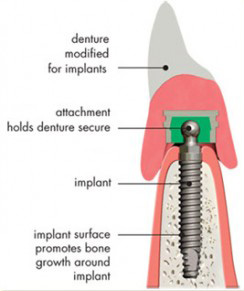I have been using dental implants in our Madera office to restore smiles for a long time. With the use of state of the art technology, as well as refined materials and techniques, I’m able to provide patients with safe, aesthetic, and predictable dental implant therapy.
A dental implant is often the best thing I can offer my patients because:
- Implants look and feel a lot like your natural teeth.
- We don’t have to shave down the healthy adjacent teeth for a bridge.
- If maintained through routine re-care (checkups and cleanings), they can last a lifetime.
These are just a few of the benefits dental implants can offer. The following information will discusst what happens after a tooth is lost, the problems with dentures and how implants can secure them, and details about dental implants, and who is a good candidate for them.

Before implants

After implants
What happens after tooth loss?
Shortly after tooth loss the bone in the jaws begins to shrink. It is estimated that 25% of bone volume is lost within the first year following tooth loss. This loss of bone volume will continue if the bone is not stimulated by dental implants.

Teeth are not just for chewing. They play an important role in speech by helping you make certain sounds like “S” and “F”. Teeth also give support to the face and lips, helping them look fuller. Here is an animation of tooth loss and the gradual changes that take place as the bone reabsorbs, the bite begins to collapse, and the face and lips lose support.

In a way you can think of implants as dentistry’s anti-aging solution. To summarize, dental implants:
- Allow you to look and feel younger
- Stimulate the bone in the jaws
- Help you maintain function and speech
What if I have been missing teeth for a long time?
We are now able to rebuild the bone that was lost after tooth loss. Grafting techniques rebuild the bone which allows us to place dental implants with much greater success and long-term stability.
An estimated 20 million people in the U.S. have lost all of their teeth and up until now have had no choice but to put up with their dentures. I’m very excited to share with you how dental implants can change that.
What is the Problem with Dentures?
- 66% of people complain that their denture is loose and uncomfortable. The risk of an embarrassing moment from a loose denture can significantly affect your social life, speech, and romantic situations.
- 88% of people have difficulty with speech.
- 63% of people experienced movement/looseness with their lower denture.
- 50% avoid eating certain foods. Some people find it easier to chew without their denture!
- The bite forces one can generate with a denture is 75% less when compared to natural teeth.
- Chewing efficiency decreases by 32% once you start wearing dentures.
It is no wonder that more than $200 million are spent each year on denture adhesives! Dental implants are the permanent solution for the lack of retention, the risk of embarrassing situations, and stimulating/maintaining the bone of the jaws (more on this topic).
How Can Implants Stabilize My Dentures?
Once the dental implants are in place, a special “male” attachment goes on top of the implant and the inside of the denture is retrofitted with a “female” attachment. This allows the denture to snap onto the implant increasing stability and retention. The denture now rests on the implants instead of the gum and bone virtually eliminating sore spots from pressure exerted while chewing.
So far, we’ve been discussing the benefits of dental implants. Now we hope to answer some frequently asked questions about dental implants.
What are dental implants?
A dental implant is made up of three parts. There is a titanium screw that is placed in the bone and acts much like the root of your natural tooth. The second part is a post called an abutment, which is attached to the implant screw. Lastly is a custom made crown that goes over the abutment.

How can implants be used to replace missing teeth?
A single implant can be used to replace a single tooth, and two or more implants can be used to support a bridge. Dental implants can also be used for retention of a removable partial or a complete denture by allowing the denture to clip onto the implant.
Who is a good candidate for the procedure?
If you are generally healthy, you are a good candidate. However, if you smoke, have diabetes, had radiation to your head and neck, or were diagnosed with osteoporosis, then we will need to discuss additional risks during your office visit. An evaluation of the bone where the implants are to be placed is also needed.
Is the procedure painful?
I make sure all my patients are safe and comfortable when under my care. During the procedure, most patients report little to no pain.
How much are dental implants?
We have options that will fit most budgets. We even have 0% interest free financing available. Since every situation is unique, we recommend a consultation to identify your treatment goals, we can then put together a plan to help you achieve those goals while staying within your budget. At your consultation appointment we will:

- Answer any questions you might have.
- Do a site specific oral examination.
- Take radiographs and other necessary imaging.
- Make impressions of your teeth.
- Discuss the anticipated length of treatment.
- Discuss the anticipated cost of treatment.
Schedule Your Implant Consultation Today!


